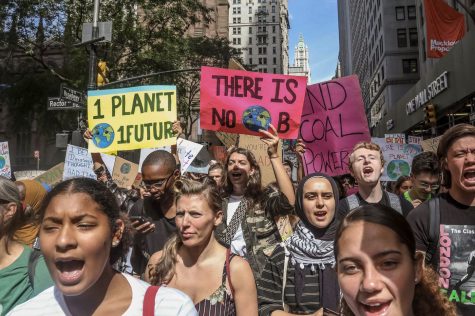“Ignorance is Bliss”: Not When Our Earth’s Amiss
May 15, 2021

When one thinks about high school education, the first thing that comes to mind are subjects such as english, world language, history, math, and science. Schools are notorious for selectively teaching topics fitting their curriculum’s requirements, while completely missing the mark on subjects pertaining to their impact on society. Whether in-person or online, children in America are not getting the information they need on a progressively impending topic: climate change.
If I’ve learned anything over the past year of isolation, it’s that I have a voice and it’s my moral obligation to use it.
Let me fill you in on a few global warming-related atrocities that are plaguing countries around the world.
Last year, Super Typhoon Goni ravaged the northern Philippines, slamming into Manila, its capital. It devastated the area, killing 31 people, obliterating over 250,000 homes, and causing over $1 billion in damage.
What about the debilitating seasonal monsoon flooding China from June through September of 2020. EM-DAT, the international disasters database, ranked it as the third most expensive non-U.S. weather disaster since 1990, killing 278 people, destroying 1.4 million homes and businesses, and causing $32 billion in damage.
Think you’re all caught up? Not even close. Did you know that increased ocean water and air temperatures amplify air moisture content, leading to surging rates of precipitation intensity, duration, and frequency?
Or that the rising concentration of atmospheric carbon dioxide increases ocean surface temperatures, causing ocean acidification? Doesn’t ring a bell? Blame climate change education in America.
“Climate change education is absolutely essential,” began one AEDT sophomore. “Prior to this interview, I had no idea about some of the ongoing implications human’s carbon footprint had on the environment. The first step is standing up for ourselves and demanding that educators integrate climate education into our curriculums.”
Another BCA student stated: “Climate change is a whole world beyond adding fractions and analyzing Shakespeare’s greatest works. It’s beyond me that I’ve been at BCA for so long without one solid lesson on my impact on our Earth or even a breakdown of basic climate vocabulary.”
A report from The New York Times found that “only 36 states and the District of Columbia include the reality of human-caused climate change” in their curriculums. Even more concerning is that, “the rest reference the human role as a possibility or a matter of scientific debate, or omit it entirely.”
You may be thinking to yourself, 36 of 50 states isn’t too bad. Well, what if I told you a 2016 study from the National Center for Science Education learned that of the 71% of middle and high school science teachers teaching about climate change, the median amount of time spent on the topic was only 1.5 hours per school year. And, only 7% of high schoolers take the class it is covered most frequently in: earth science.
So, why am I telling you this? Educating future generations about the science behind global climate change and its ubiquitous influence on our future is imperative in creating and implementing solutions among a more informed, readily adaptable public. Integration of these ideas encourages a widespread understanding of the impacts of global warming while increasing “climate literacy” among today’s youth. Essentially, raising awareness for this issue encourages young people to tackle the consequences this threat poses on their future with an open mind, able to adapt to this global emergency.
Now, it’s your turn. You may think you’re too young, uninformed, or small to make actual change; however, by spreading awareness, you’re already making a difference.
BCA has a number of climate change-oriented clubs and organizations, run by students for students, including Sunrise Bergen, Youth Climate Action Coalition, Linens N Love, and more. Getting involved with even one of these clubs is not only a good way to learn about and spread awareness of sustainability and environmentalism but also to take a look at your impact on this issue. BCA’s sustainability committee also raises awareness of the climate change education deficit prevalent at our school and tackles this issue head-on.
If I’ve learned anything over the past year of isolation, it’s that we have a voice and our moral obligation to use it. Take the time to educate yourself or even consider joining one of the many clubs and coalitions, in and outside of BCA, dedicated to making real change and drumming up support for climate education.
Sources
Lack of Education Causes Climate Denial – Alliance for Climate Education
How to Implement Climate Change Education in Schools – Study International
CO2 and Ocean Acidification: Causes, Impacts, Solutions – Union of Concerned Scientists
Getting Climate Studies Into Schools – The New York Times
The Top 10 Extreme Weather and Climate Events of 2020 – EcoWatch
Why Should Schools Teach Climate Education? – UN CC:Learn
Image Credits
In New Jersey Schools, Climate Change Education Will Be Mandatory – The Philadelphia Inquirer





